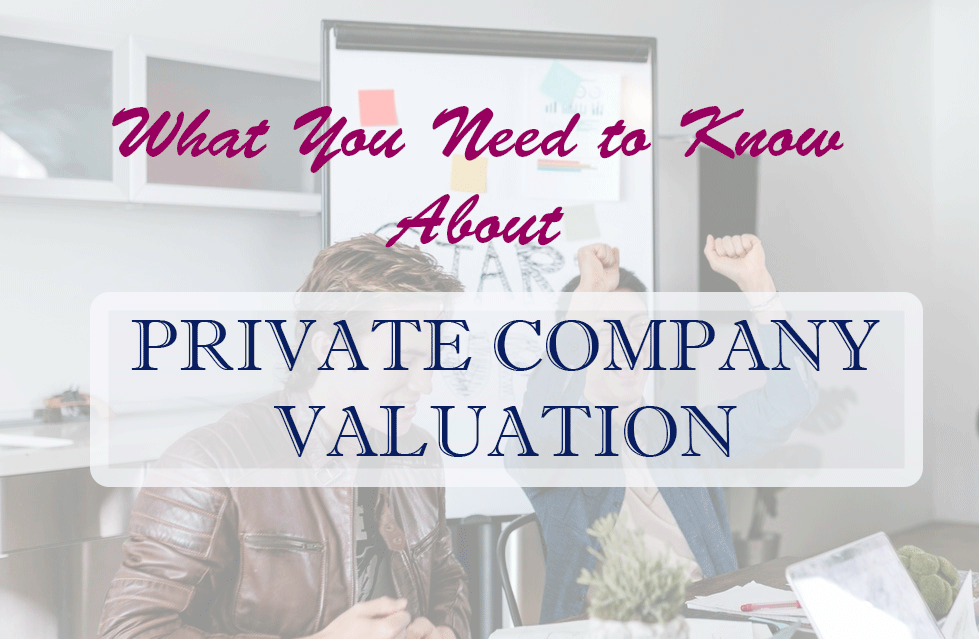All You Need to Know About Private Company Valuation
"With the explosion of private company valuations, the need to learn about business valuations is more crucial!"
Gary Rushin, CPA

All You Need to Know About Private Company Valuation
Here is what you need. Learning about private company valuation.
More than ever, the question of what that company is worth has baffled the best of entrepreneurs and investors. And with the market expectation grows and increased valuation determinations occur, the need to know about private company valuation is more critical now.
With economy recovering from the impact of COVID, now is time to learn the need to know about private company valuation.
Issues with Company Valuation
I remember the time as an analyst when I valued private and public companies during corporate restructurings, mergers and acquisitions. And I also remember the numerous technical books and courses I had to go through to obtain a comprehensive understanding of business valuation. Great training, that is what I can say. Now I look at businesses with the mindset what is the company worth and whether a company is creating value or destroy value.
Paradoxically, my knowledge of business valuation enabled me to make key strategic moves when I as a CEO of a distressed manufacturing company. It is about knowing what strategic moves create value that stakeholders expects you to deliver.
Investors, business owners, and professionals should try to understand business valuation and especially private company valuation. As a business person, you will be ahead of the game.
Surprisingly, some private company valuations are significantly higher than comparable public company valuations. A higher-valued company may be considered a unicorn, a term used in the venture capital industry to describe a startup company with a value of over $1 billion.
Moreover, developing a private company valuation requires mastering one's emotions and impulses and analyzing a private company from a strictly objective perspective. Unfortunately, "the fear of missing out" or FOMO is an emotional trap that can result in higher valuations.
The recent explosion of Special-Purpose Acquisition Companies (SPAC) is an example. The Securities and Exchange Commission inquiring about the liberal valuation of private companies expecting excessive revenue growth.
Private Company Valuation
Let me start by saying that a company's net worth, as determined by the balance sheet, is not the business's value! The net worth is the total assets minus its liabilities. The book value net worth shows the company's residual book value. However, book value does not indicate what a willing buyer would pay for the business, which is the basis of business valuation.
Furthermore, the value of a public company with widely traded common shares is easy to determine! Many believe in the efficient market hypothesis (EMH) or theory, which means that share prices reflect all information available to the market to set the stock price.
All you have to do is obtain the company's outstanding number of common shares multiplied by its stock price. Just get the stock price from Google Finance, Bloomberg, or the Wall Street Journal. What you get is the value of the business, known as the public company's market capitalization.
This process sounds simple. However, it is not the same for providing a valuation of a private company.
Public companies adhere to regulatory guidelines established by various federal, state, and non-governmental bodies such as the Securities and Exchange Commission, state regulatory agencies, and the different stock exchanges. In contrast, public company regulatory frameworks do not bind private companies.
As you know, private company information is not readily available. Without knowledge, and more specifically, Private Market Data, evaluating a private company is challenging. We cannot use the EMH. Furthermore, most private companies broadcast financial results. One solution is to use tools such as PrivCo or PitchBook.
Valuation helps companies to gauge their performance compared to their counterparts in the same industry. Investors also need the valuation data to know the net worth of a company before investing. Let us look at some methods used to value private companies.
Comparable Company Analysis (CCA)
The CCA method assumes that similar businesses that work in the same industry also have comparable multiples. Using the metrics of other companies of relative size in the same industry provides similar valuation indicators.
Moreover, it is a common practice among valuers to use other companies in the same field and use the average multiples to get the valuation of an unknown private company. It is advisable to seek companies of cash flows, growth potential, and risks similar to the business you are valuing.
A common multiple widely used is the cash flow multiple, cash flow as a percentage of sales or enterprise value to cash flow (understood as EV/cash flow). Known as the EBITDA multiple, the cash flow multiple indicates the firm's generation of cash.
Notwithstanding ratios, cash flow is more acceptable than profitability multiples such as net income, pre-tax income, and operating income. EBITDA means earnings before interest, taxes, depreciation, and amortization, eliminating non-cash expenses to determine enterprise cash throw off.


Discounted Cash Flow (DCF) Method
In my opinion, the DCF method is a better method of comparable company analysis. The discounted cash flow method aims to estimate the value of an enterprise's worth today based on future cash flows.
Most want to know how much cash a business generates above investments to produce the desired return level. DCF indicates the intrinsic value of the company.
Intrinsic value is a company's value calculated by integrating projected future cash flows, discounting the cash flows using the time value of money, and assessing a terminal value requiring financial modeling.
Financial modeling is effectively a mathematical representation using generally accepted accounting principles and weighing factors.
Overall, analysts use many assumptions and attempts to lessen subjectivity. However, despite best attempts, a private company valuation may be over-or undervalued. Overall, intrinsic value is an educated attempt to capture a valuation number or range.
Vital elements of DCF include:
- (a). Forecast Period: You must determine a reasonable timeframe, generally between 5 to 10 years.
- (b). Forecast Cash Flows: You must project annual cash flows accounting for every year.
- (c). Forecast Discount Rate: You must calculate a discount rate or annual rate that reflects the risks relating to the average cost of capital.
- (d). Forecast Terminal Value: You must estimate the terminal value, which attempts to capture perpetual enterprise cash flows. The terminal value is the value of the business representing the end of the forecast period. The terminal value is relevant for young companies because so many young companies fail.
First Chicago Valuation Method
The Chicago Valuation Method [4] of valuation combines the discounted cash flow method and multiple-based method. We can view the process as an aggregator of different valuation methods. The First Chicago Valuation Method assumes a three-case scenario and assigning a probability or a degree of likelihood.
The three scenarios are the optimistic or best possible, most likely-case, and pessimistic or worst-case scenario. The valuation of the three case scenarios is determined using the discounted cash flow method.
The weighted average of the three ways determines the valuation of the business. Not surprisingly, equity capital investors rely on the first Chicago method because it considers both the company's lower and upper sides.
Ways Private Company Valuations Are Used
You need to know about private company valuation for many reasons. Resolving tax, legal, and estate issues and disputes requires valuation determinations. The need includes:
1. Minimizing estate taxes
2. The sale, purchase, or merger of a private company
3. Spin-Off of a private company
4. Obtaining financing
5. Divorce property settlement
7. Buy-Out of dissident minority shareholders
8. Charitable contribution
9. Reorganization of a distressed business
Final thoughts: All You Need to Know Business Valuation
Overall, many private company owners do not know what their companies are worth, and they keep on guessing. Such ignorance of what the company is worth could cost investors millions or multi-millions of dollars.
The business could result in selling their businesses at a lower cost if they do not make a valuation point.
Knowing the value of the company helps in determining the rates of taxes payable. A valuation can be an expensive exercise, but it is worth the cost, and private companies need to embrace it for any eventuality.
The process is of utmost importance to owners, sellers, buyers, and financiers. What other types of valuation methods are you using?
